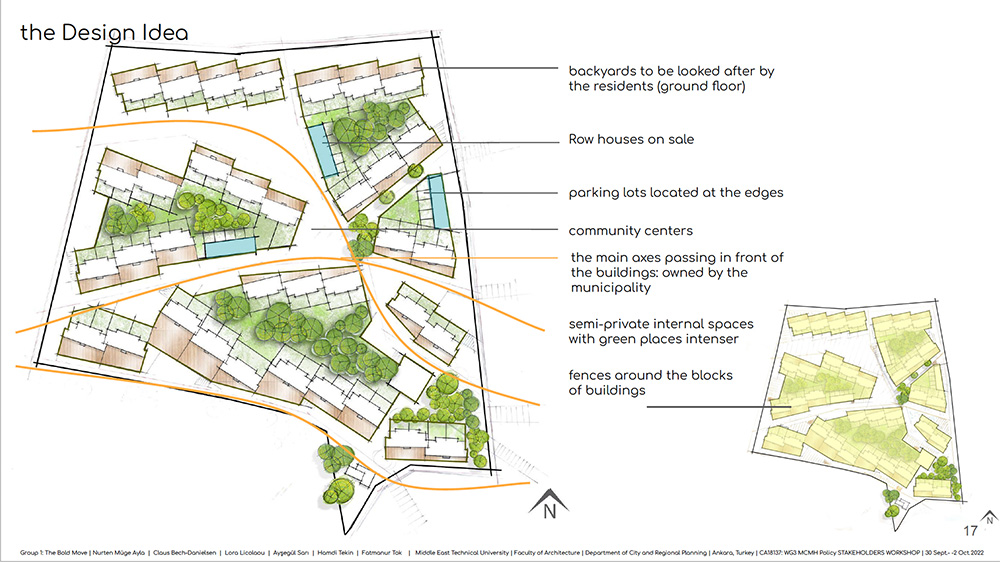Perspectives from a Stakeholder Workshop
Additional Files
DOI:
https://doi.org/10.52200/docomomo.68.07Keywords:
participatory planning and design, stakeholder workshop, middle-class mass housing, sustainability, quality of life, co-creationAbstract
This article presents and discusses the results of the Stakeholder Workshop (Co) Designing for Quality of Life: Exploring Challenges and Opportunities, which was held at Middle East Technical University (METU) in Ankara in October 2022 in the framework of the COST Action CA18137 European Middle Class Mass Housing (MCMH-EU). The workshop aimed to discover the possibilities of participatory design as a tool to address the necessary updating of the housing complexes of the Modern Movement (MoMo). The workshop, which was conducted on a cooperative housing estate, namely Ümitköy Sitesi, Ankara, Türkiye (1970), was carried out in five groups with members of different nationalities, ages, and experiences. This article argues that the public and private strategies which were followed to rehabilitate these complexes by focusing on the technical problems (construction pathologies, energy inefficiency, accessibility, parking, among others) tend to neglect, even ignore, the diverse social aspects involved. As a group of participants of this workshop, the authors of this article consider the involvement of all parties (experts, residents, housing management cooperative, and municipality) in the improvement processes of such middle-class mass housing sites as the key instrument to make these neighborhoods more inclusive and sustainable. This article evaluates the Stakeholder Workshop’s co-design performance as an instrument to improve the Quality of life (QoL) and sustainability of the neighborhood. The critical analysis of the workshop results leads to several significant conclusions: Social aspirations do not always coincide with political and technical ones; technical rehabilitations are not sufficient for the total improvement of QoL and sustainability of communities; (Co-)Design may have to be approached from different perspectives and, consequently, have different results; citizens have a great potential to participate and contribute to the improvement of QoL with innovative ideas and actions of different scales. However, the socioeconomic diversity of the inhabitants and restrictive legislation are the difficulties to be considered.
How to Cite
Published
Issue
Section
License
Copyright (c) 2023 MUGE AKKAR ERCAN, CLAUS BECH-DANIELSEN, HASSAN ESTAJI, ROBERTO GOYCOOLEA-PRADO, BERNARD HAUMONT, BYRON IOANNOU, LORA NICOLAOU, PAZ NUÑEZ-MARTÍ, SANJIN SUBIC

This work is licensed under a Creative Commons Attribution 4.0 International License.
Plaudit
References
AŽMAN–MOMIRSKI, L., Dimitrovska-Andrews, K. (1997). Urban design workshops: A planning tool. In Urbani Izziv, 30/31, pp. 121-125. DOI: https://doi.org/10.5379/urbani-izziv-en-1997-30-31-005
ESHKOL, B. & Eshkol, A. (2017). Participatory planning in Israel: from theory to practice. In Journal of Place Management and Development, 10(3), pp. 213-239. DOI: https://doi.org/10.1108/JPMD-07-2016-0042
LISSANDRELLO, E., Morelli, N., Schillaci, D. & Di Dio, S. (2019). Urban innovation through co-design scenarios: Lessons from Palermo. In: Knoche, H., Popescu, E., Cartelli, A. (Eds.), The Interplay of Data, Technology, Place and People for Smart Learning. Springer / Cham. pp. 110-122. DOI: https://doi.org/10.1007/978-3-319-92022-1_10
MADANIPOUR, A. (2006). Roles and challenges of urban design. In Journal of Urban Design, 11(2), pp. 173–193. DOI: https://doi.org/10.1080/13574800600644035
NAYCI, N., Tan, E., Saf, H.O., Mazmancı, M.A., Arslan, H., Yalvaç, M., & Kurt, M.A. (2022). Mersin City-Lab: Co-creative and participatory design approach for a circular neighbourhood. In Journal of Design for Resilience in Architecture and Planning, 3(1), pp. 1–23. DOI: https://doi.org/10.47818/DRArch.2022.v3i1041
PIMONSATHEAN, J. (2017). Creative Community Development. From urban design studio to international collaborative workshop, In The Journal of Public Space, 2(4), pp. 111-130. DOI: https://doi.org/10.5204/jps.v2i4.146
SALVIA, G., Boffi, M., Piga, B.E.A., Rainisio, N. & Arcidiacono, A. (2021). Participatory approach for a sharing city: understanding citizens’ perceptions in a neighbourhood of Milan. In Territorio, 99(4), pp. 164-178. DOI: https://doi.org/10.3280/TR2021-099021
SHARMIN, T. & Khalid, R. (2021). Post occupancy and participatory design evaluation of a marginalized low-income settlement in Ahmedabad, India. In Building Research & Information, 50(5), pp. 574-594. DOI: https://doi.org/10.1080/09613218.2021.2018286
SHIRAZI, M.R., Kevani, R., Brownill, S. & Butina Watson, G. (2022). Promoting Social Sustainability of Urban Neighbourhoods: The Case of Bethnal Green, London. In International Journal of Urban and Regional Research, 46(3), pp. 441-465. DOI: https://doi.org/10.1111/1468-2427.12946
UKESSAYS. (November 2018). Public Participation Planning. https://www.ukessays.com/essays/project-management/public-participation-planning.php Accessed December, 2022.
URBAN LAND INSTITUTE (2023). Urban Design Climate Workshop: Gowanus, Brooklyn. https://newyork.uli.org/uli-resources/urban-design-climate-workshop-gowanus-brooklyn/ Accessed December, 2022.
WONG, S.C. (2022) Walking Tours and Community Heritage in Singapore. In: Cho, I.S., Kriznik, B., Hou, J. (Eds.), Emerging Civic Urbanisms in Asia, Amsterdam University Press / Amsterdam, pp. 41-70. DOI: https://doi.org/10.2307/j.ctv2vszxdq.6
ESMAP (2020). Global Photovoltaic Power Potential by Country. World Bank: Washington, DC. https://documents1.worldbank.org/curated/en/466331592817725242/pdf/Global-Photovoltaic-Power-Potential-by-Country.pdf/ Accessed October 2022.
YALE URBAN DESIGN WORKSHOP (2023). Dwight Healthy and Just Neighborhood. https://udw.architecture.yale.edu/projects/dwightAQM Accessed December, 2022.





